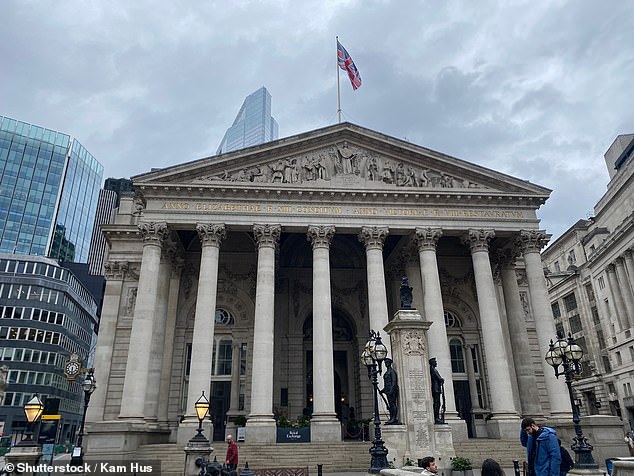What rising inflation means for you: HUGO DUNCAN on why it dashes hopes for a Christmas Bank of England rate cut
There will be no early Christmas present from the Bank of England.
The increase in inflation announced today – from 1.7 percent in September to 2.3 percent in October – has dashed all hopes of a new interest rate cut this year.
The cost of living has risen again due to the increase in household energy bills; the price ceiling rose from £1,568 to £1,717 per year at the beginning of last month.
Every household in the country will now feel the impact of more expensive heating as an Arctic blast rages across Britain.
A further increase in the price ceiling is expected in January, further increasing pressure on household finances and inflation.
Inflation has a direct impact on the cost of borrowing – and in particular the cost of mortgages faced by millions of homeowners and those looking to get into the housing market.
Inflation rose to 2.3 percent in October as fears grow over the fallout from fiscal and global trade tensions

The increase in inflation announced today, from 1.7 percent in September to 2.3 percent in October, has dashed hopes for a new interest rate cut by the Bank of England (file image)
This is because the Bank of England typically raises rates to control inflation and cuts rates when inflation is no longer a threat.
And today’s news isn’t much reading for those hoping for a series of quick rate cuts.
The increase in inflation from 1.7 percent to 2.3 percent was the largest increase in one month since October 2022 – although inflation was then a stiff 11.1 percent.
And the price increase of 2.3 percent compared to a year earlier was greater than feared.
That means the Bank of England is less likely to cut rates in the coming months.
The next step may not come until spring. Just a few weeks ago, there were hopes for a succession of cuts in the coming months.
The rates set by the Bank affect the amount lenders charge borrowers for mortgages.
Mortgage rates soared as the Bank raised rates from an all-time low of 0.1 percent in December 2021 to as much as 5.25 percent in August 2023, to curb inflation from its peak above 11 percent.
This interest rate was maintained until August this year, when the Bank cut it to 5 percent. These were reduced for the second time this month to 4.75 percent.
The reductions so far have been much slower than many would have liked – meaning mortgage rates remain high.
But it is not just the impact of higher energy bills on current inflation that worries the Bank.
The Chancellor’s budget is also seen as a threat to inflation – with the increase in the minimum wage and increases in national insurance contributions paid by employers likely to raise prices and cost jobs at the same time.
Bank of England Governor Andrew Bailey warned yesterday that Rachel Reeves’ measures mean further interest rate cuts must take place ‘gradually’.
In other words, the Chancellor’s spending – paid for by higher taxes and more borrowing – threatens to make mortgages more expensive than they might otherwise have been.
Another blow to the ‘working people’ she promised to help.
Global events are also impacting borrowing costs in Britain – from the election of Donald Trump in the US to the impact on energy prices of wars in Ukraine and the Middle East.
But while a rate cut before Christmas now seems unlikely, the outlook for inflation means rates are likely to fall again next year.
The problem for many, however, is that the cuts may not come as quickly as they would like.
